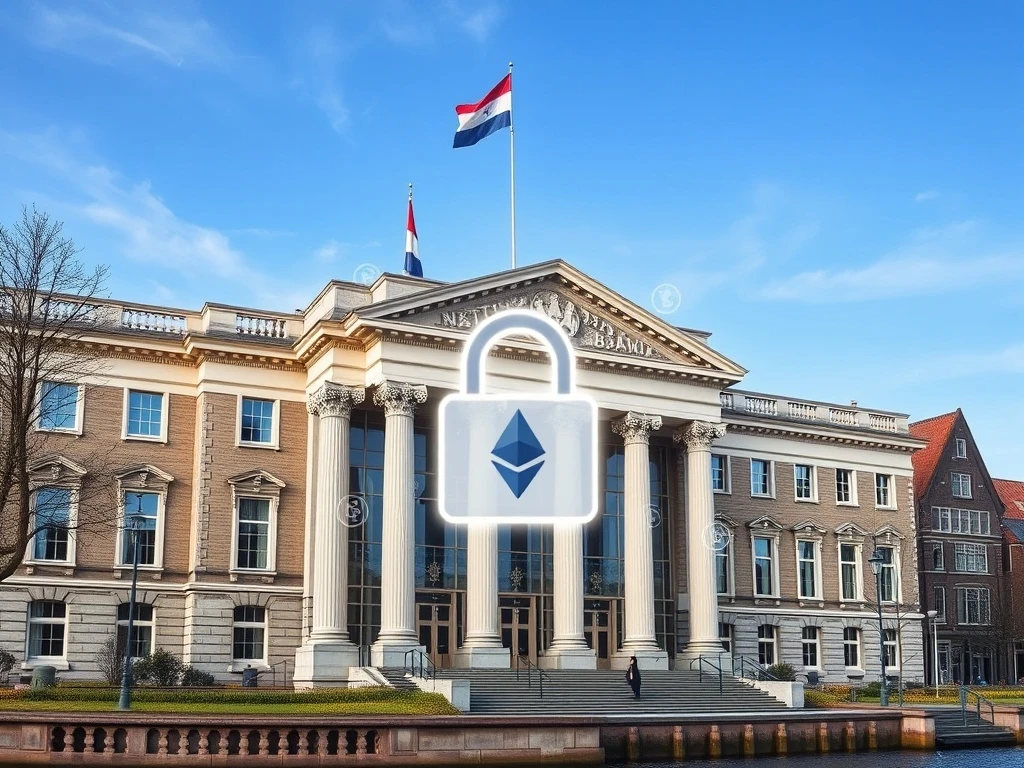OKX Netherlands Fine: Crypto Giant Faces Stiff Penalty Ahead of MiCA Rollout

The cryptocurrency world is abuzz with news from Europe. Recently, a significant development caught the attention of investors and exchanges alike. The Dutch National Bank (DNB) imposed a substantial **OKX Netherlands fine** on crypto exchange OKX. This penalty highlights the increasing focus on regulatory adherence within the digital asset space.
Unpacking the OKX Netherlands Fine and Regulatory Context
The Dutch National Bank announced a 2.25 million euro (approximately $2.6 million) fine against OKX. This penalty stems from the exchange’s operation in the Netherlands without proper registration. The DNB’s announcement on Wednesday detailed the period of non-compliance. It covered July 2023 to August 2024. Significantly, this period predates the full implementation of the European Union’s Markets in Crypto-Assets (MiCA) regime.
Dutch regulators began requiring crypto firms to register in early 2020. This mandate aimed at Anti-Money Laundering (AML) purposes. An OKX spokesperson commented on the situation. They expressed satisfaction at having resolved the matter. Furthermore, the representative maintained that OKX did not actively target Dutch customers during the specified period. They also emphasized that this fine does not apply to OKCoin Europe. This entity holds a MiCAR-licensed status. The Netherlands remains an important market for the firm, according to the spokesperson.
The Shadow of Unlicensed Crypto Operations
The DNB has a history of enforcing these registration rules. Similar fines have been issued to other major players in the crypto industry. In March of last year, reports surfaced about a fine against Crypto.com. This exchange operated without registration for over two years. Before that, in 2022, the DNB fined Binance for the same reason. Binance subsequently exited the Dutch market. In 2023, Coinbase also faced a fine from the DNB for non-compliance. These instances underscore a clear pattern. Operating without proper authorization for **unlicensed crypto operations** carries significant financial and reputational risks.
The consistent enforcement by the DNB sends a strong message. Crypto exchanges must prioritize legal registration. This ensures they meet local AML requirements. Failure to do so results in substantial penalties. This regulatory stance aims to protect consumers and prevent illicit financial activities. Therefore, understanding and adhering to local laws is crucial for any crypto business.
MiCA Regulation Impact on European Crypto Markets
The European Union’s MiCA framework represents a landmark achievement. It provides a harmonized regulatory framework for crypto-assets across all member states. This framework aims to foster innovation while ensuring market integrity and consumer protection. The **MiCA regulation impact** is set to standardize compliance requirements. This will simplify operations for licensed entities. The **OKX Netherlands fine**, however, relates to a period before MiCA’s full enforcement. This distinction is vital. It highlights the existing national rules that crypto firms must follow, even as broader EU legislation takes shape.
OKX, through its entity OKCoin Europe, now holds a MiCAR license. This authorization allows it to operate legally within the country. This strategic move demonstrates the exchange’s commitment to long-term European market participation. It also shows a proactive approach to regulatory changes. Exchanges that adapt early to these new standards will likely gain a competitive advantage. They will also build greater trust with regulators and users.
Dutch Crypto Compliance: A Growing Priority
The Netherlands is rapidly becoming a hub for crypto innovation. This is happening despite strict regulatory oversight. **Dutch crypto compliance** is a major focus for firms entering or expanding in the region. Recent developments highlight this dynamic environment:
- Last month, Dutch service provider Amdax announced plans to launch a Bitcoin treasury company. It will list on Amsterdam’s Euronext stock exchange.
- Amdax secured approximately $23.3 million in initial financing. This shows strong investor confidence in the Dutch crypto market.
- The Dutch Authority for Financial Markets (AFM) granted a MiCA license to local exchange Bitvavo in June.
- The local government proposed new laws in October. These would require crypto service providers to share user data with tax authorities.
This evolving landscape attracts significant corporate attention. In late September, Kraken acquired Coin Meester. This move expanded Kraken’s presence in the Dutch market. These examples show a growing maturity in the Dutch crypto ecosystem. They also emphasize the need for robust compliance frameworks.
OKX’s Global Regulatory Scrutiny
The Netherlands is not the only jurisdiction where OKX has faced regulatory challenges. The exchange has experienced **global regulatory scrutiny** in recent times. In early April, Maltese authorities fined OKX 1.1 million euros (approximately $1.2 million). This fine was for violating local AML rules. Authorities noted serious and systematic compliance failures from 2023. They stated these issues could not be ignored.
Furthermore, the Philippines Securities and Exchange Commission issued a warning. This occurred early last month. OKX was among ten major crypto exchanges cited. These platforms were operating without required authorization. The regulator cautioned that these platforms continued to offer services to Philippine users. This was despite lacking necessary registration. These international incidents underscore a broader trend. Regulators worldwide are tightening their grip on crypto operations. They demand adherence to local laws and international standards.
Conclusion: Navigating the Regulatory Landscape
The **OKX Netherlands fine** serves as a stark reminder. Crypto exchanges must prioritize regulatory compliance across all operating jurisdictions. The DNB’s consistent enforcement, coupled with the upcoming **MiCA regulation impact**, signals a new era. This era demands transparency and strict adherence to **Dutch crypto compliance** and broader EU standards. Exchanges engaging in **unlicensed crypto operations** face severe consequences. As **global regulatory scrutiny** intensifies, proactive engagement with legal frameworks becomes paramount. Firms like OKX, by securing MiCAR licenses, demonstrate a path forward. They embrace regulation as a means to foster trust and ensure sustainable growth in the dynamic world of digital assets.







